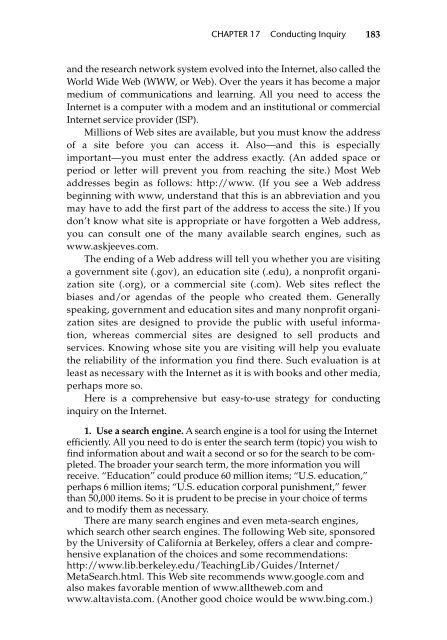Beyond Feelings
Beyond Feelings
Beyond Feelings
You also want an ePaper? Increase the reach of your titles
YUMPU automatically turns print PDFs into web optimized ePapers that Google loves.
CHAPTER 17 Conducting Inquiry<br />
183<br />
and the research network system evolved into the Internet, also called the<br />
World Wide Web (WWW, or Web). Over the years it has become a major<br />
medium of communications and learning. All you need to access the<br />
Internet is a computer with a modem and an institutional or commercial<br />
Internet service provider (ISP).<br />
Millions of Web sites are available, but you must know the address<br />
of a site before you can access it. Also—and this is especially<br />
important—you must enter the address exactly. (An added space or<br />
period or letter will prevent you from reaching the site.) Most Web<br />
addresses begin as follows: http://www. (If you see a Web address<br />
beginning with www, understand that this is an abbreviation and you<br />
may have to add the first part of the address to access the site.) If you<br />
don’t know what site is appropriate or have forgotten a Web address,<br />
you can consult one of the many available search engines, such as<br />
www.askjeeves.com.<br />
The ending of a Web address will tell you whether you are visiting<br />
a government site (.gov), an education site (.edu), a nonprofit organization<br />
site (.org), or a commercial site (.com). Web sites reflect the<br />
biases and/or agendas of the people who created them. Generally<br />
speaking, government and education sites and many nonprofit organization<br />
sites are designed to provide the public with useful information,<br />
whereas commercial sites are designed to sell products and<br />
services. Knowing whose site you are visiting will help you evaluate<br />
the reliability of the information you find there. Such evaluation is at<br />
least as necessary with the Internet as it is with books and other media,<br />
perhaps more so.<br />
Here is a comprehensive but easy-to-use strategy for conducting<br />
inquiry on the Internet.<br />
1. Use a search engine. A search engine is a tool for using the Internet<br />
efficiently. All you need to do is enter the search term (topic) you wish to<br />
find information about and wait a second or so for the search to be completed.<br />
The broader your search term, the more information you will<br />
receive. “Education” could produce 60 million items; “U.S. education,”<br />
perhaps 6 million items; “U.S. education corporal punishment,” fewer<br />
than 50,000 items. So it is prudent to be precise in your choice of terms<br />
and to modify them as necessary.<br />
There are many search engines and even meta-search engines,<br />
which search other search engines. The following Web site, sponsored<br />
by the University of California at Berkeley, offers a clear and comprehensive<br />
explanation of the choices and some recommendations:<br />
http://www.lib.berkeley.edu/TeachingLib/Guides/Internet/<br />
MetaSearch.html. This Web site recommends www.google.com and<br />
also makes favorable mention of www.alltheweb.com and<br />
www.altavista.com. (Another good choice would be www.bing.com.)


